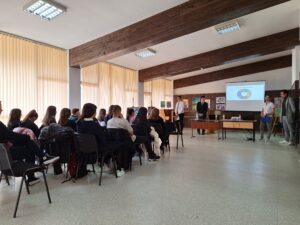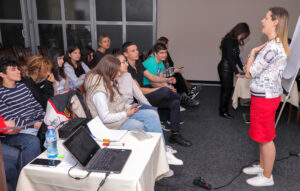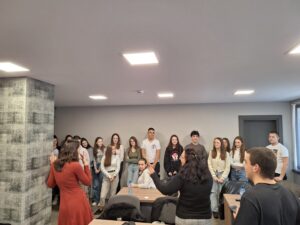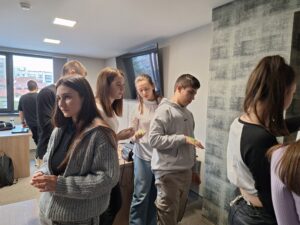In Mach 2024 young people attended workshops how to counter disinformation. More than 100 students from local schools have been engaged in exploring the nature of disinformation, fact checking and dealing with false news. The seminars took place as follows: 15 and 16 March 2024 – Montana and Vurshets; 21 march 2024 – Gotse Delchev; and 27 March 2024 – Blagoevgrad.
The Program included topics such as human security and media literacy; history of disinformation; definition of types of distorted information; fact checking and how to stop the spread of misinformation and disinformation; the role of the artificial intelligence and algorithms for creating and spreading disinformation; the role of stories, narratives, and power in disinformation; and social media, security and active citizenship.
The role of trainers and facilitators was taken by teachers from local schools who have been trained as trainers who multiply the knowledge and skills to a bigger youth audience. In addition, they will be guided to incorporate the program where appropriate into their academic curriculum at school /e.g. civic education, history, IT/. Experts from Partners Bulgaria support the teachers in this work.
Training seminar with young people in Blagoevgrad – 27 March 2024



Training seminar with young people in Gotse Delchev – 21 March 2024



Training seminar with young people in Vurshets – 16 March 2024



Training seminar with young people in Montana – 15 March 2024




The project aims at increasing public resilience to disinformation and thus reducing risks that represent threat to national security. It is a 12 months initiative focused on supporting schools to accommodate media literacy program and thus
1/ build youth resiliency to disinformation and misinformation; and
2/ engage youth in civic initiatives addressing security risks as a result of disinformation and misinformation and strengthen their media literacy.
These objectives are achieved by activities such as development of educational materials and curriculum; a toolkit for teachers and facilitators; workshops for youth and adult learners from 4 communities; students’ study trip to NATO; and youth led initiatives to conduct campaigns countering disinformation related to chosen issue of public importance in each community.
As a result, youth will increase their media literacy and civic participation; they will take action to counter disinformation. The curriculum and the toolkit will be published in Bulgarian and English which will help multiplication of the program among youth, schools and the public.
The project is designed to work towards increasing public understanding of NATO’s critical role in ensuring regional and global security. The activities target both adult and younger audiences and shore up support for NATO security priorities along with countering and building resilience to disinformation and misinformation.

